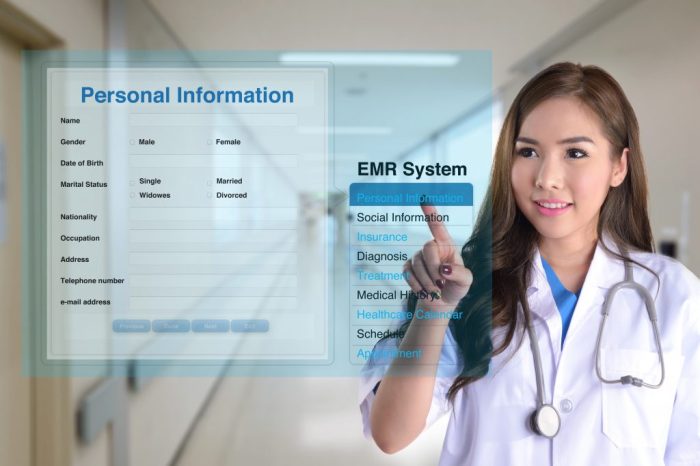
Patient Access to Health Records sets the stage for this enthralling narrative, offering readers a glimpse into a story that is rich in detail and brimming with originality from the outset. This topic delves into the significance of patients having access to their health records, exploring the benefits, challenges, and potential improvements in healthcare outcomes.
As we unravel the layers of patient access to health records, we discover a world where information is key to empowerment and better healthcare decisions. Let’s dive into the intricacies of this crucial aspect of modern healthcare.
Patient Access to Health Records
Patient access to their health records is crucial in ensuring they have a comprehensive understanding of their medical history, treatment plans, and test results. This access empowers patients to take control of their healthcare journey and make informed decisions regarding their health.
Importance of Patient Access to Health Records
- Enhanced Communication: Patients can effectively communicate with their healthcare providers by having access to their health records, ensuring accurate and timely information exchange.
- Improved Coordination of Care: Access to health records allows for better coordination between different healthcare providers, reducing the likelihood of duplication of tests and procedures.
- Empowerment and Engagement: Patients who can access their health records are more engaged in their healthcare, leading to better adherence to treatment plans and overall health outcomes.
Benefits of Patient Access to Health Records
- Increased Patient Satisfaction: Patients feel more satisfied when they have access to their health records, as it provides transparency and fosters trust in the healthcare system.
- Better Health Monitoring: Patients can track their progress, monitor chronic conditions, and identify any discrepancies in their records that may require correction.
- Empowerment for Decision Making: Access to health records allows patients to actively participate in medical decisions, leading to personalized care that aligns with their preferences and values.
How Patient Access to Health Records Improves Healthcare Outcomes
- Preventative Care: Patients who can access their health records are more likely to engage in preventative care measures, leading to early detection and intervention for potential health issues.
- Reduced Medical Errors: Patient access to health records helps in identifying and correcting errors, reducing the risk of medical mistakes that could impact patient safety.
- Enhanced Care Coordination: Healthcare providers can collaborate more effectively when patients have access to their health records, ensuring seamless transitions between different points of care.
Healthcare Access
Accessing health records can be a challenging process for many patients, often leading to delays in receiving critical information about their medical history and treatment plans. This lack of transparency can hinder the patient’s ability to actively participate in their own healthcare decisions and may result in gaps in care.
Challenges Patients Face in Accessing Health Records
- Complexity of the Healthcare System: Patients may struggle to navigate the intricate processes involved in requesting and obtaining their health records.
- Legal and Privacy Concerns: Stringent regulations surrounding patient data privacy can create barriers to accessing health records, especially when dealing with multiple healthcare providers.
- Technological Barriers: Limited access to technology or lack of digital literacy can impede patients from securely accessing their health records online.
Improved Healthcare Access and Patient Outcomes
- Empowered Decision-Making: Easy access to health records allows patients to make informed decisions about their care, leading to better treatment outcomes.
- Enhanced Care Coordination: Healthcare providers can collaborate more effectively when patients have seamless access to their medical information, reducing the risk of medical errors.
- Preventive Care and Early Intervention: Timely access to health records enables early detection of health issues, facilitating preventive measures that can improve patient outcomes.
Role of Technology in Enhancing Healthcare Access
- Electronic Health Records (EHR): Digital platforms make it easier for patients to view, update, and share their health information securely with healthcare providers.
- Telemedicine: Remote consultations and virtual visits enhance access to healthcare services, particularly for patients in rural or underserved areas.
- Mobile Health Apps: Smartphone applications provide patients with convenient access to their health records, medication reminders, and personalized health information.
Healthcare Costs
Patient access to health records can play a crucial role in reducing healthcare costs by promoting efficiency, preventing duplicate tests, avoiding unnecessary procedures, and improving care coordination. When patients have access to their health information, they are better equipped to make informed decisions about their healthcare, leading to more cost-effective treatment plans.
Strategies for Addressing Cost Barriers
- Encouraging the use of telemedicine and virtual care options to reduce in-person visits and associated costs.
- Implementing price transparency initiatives to help patients understand the cost of healthcare services and make informed choices.
- Promoting preventive care and wellness programs to reduce the need for expensive treatments for preventable conditions.
- Supporting value-based care models that focus on outcomes rather than volume of services, which can lead to lower costs and improved quality of care.
- Advocating for policies that address healthcare disparities and ensure equitable access to affordable care for all patients.
Healthcare Providers
Healthcare providers play a crucial role in supporting and facilitating patient access to health records, which can have a significant impact on the provider-patient relationship.
Supporting Patient Access
Healthcare providers can support patient access to health records by:
- Implementing secure online portals where patients can easily access their health information.
- Providing clear instructions on how patients can request and access their records.
- Ensuring compliance with regulations such as HIPAA to protect patient privacy.
- Offering assistance and guidance to patients who may have difficulty navigating their health records.
Impact on Provider-Patient Relationship
Allowing patients access to their health records can strengthen the provider-patient relationship by:
- Building trust and transparency between the patient and provider.
- Empowering patients to take an active role in their healthcare decisions.
- Improving communication and collaboration between the patient and provider.
- Enhancing patient satisfaction and overall quality of care.
Best Practices for Healthcare Providers
Some best practices for healthcare providers in ensuring patient access to health records include:
- Offering training to staff on how to assist patients in accessing their health records.
- Regularly updating and maintaining patient health records to ensure accuracy and completeness.
- Using secure technology and encryption methods to protect patient information.
- Providing patients with educational resources on how to interpret and understand their health records.
Health Insurance

Health insurance plays a crucial role in determining patient access to their health records. It can either facilitate or hinder this access based on the policies and coverage provided.
Impact of Health Insurance Policies
- Health insurance policies can dictate the level of coverage for accessing health records. Some policies may include limitations or additional costs for patients to obtain their health information.
- High deductibles or copayments required by certain health insurance plans can act as barriers for patients seeking to access their medical records, especially if they need to pay out-of-pocket.
- Insurance companies may also have specific procedures or requirements in place for patients to request and receive their health records, adding complexity to the process.
Improving Health Insurance Coverage
- Implementing policies that mandate comprehensive coverage for patient access to health records can enhance transparency and empower individuals to take control of their healthcare information.
- Reducing financial barriers such as high deductibles or copayments can make it easier for patients to access their health records without facing significant financial burdens.
- Streamlining the process for requesting and receiving health records through standardized procedures across different insurance providers can simplify the access for patients.
Health Policies
Health policies related to patient access to health records play a crucial role in shaping the healthcare landscape. These policies dictate how patients can access their medical information, impacting their privacy and data security.
Current Health Policies
- Health policies vary by country and region, with some regions having strict regulations on patient access to health records, while others have more lenient guidelines.
- In the United States, the Health Insurance Portability and Accountability Act (HIPAA) sets the standard for protecting sensitive patient information and granting access to health records.
- Some countries have implemented national electronic health record systems to streamline access for patients and healthcare providers.
Implications on Patient Privacy and Data Security
- Existing health policies can impact patient privacy by determining who has access to medical records and under what circumstances.
- Data security measures Artikeld in health policies are essential to safeguard patient information from breaches and cyber threats.
- Poorly designed policies can compromise patient privacy and expose sensitive data to unauthorized individuals.
Recommendations for Policy Improvement
- Policy makers should prioritize enhancing patient education on their rights to access health records and how to protect their privacy.
- Regular audits of healthcare facilities to ensure compliance with data security policies can help mitigate risks of breaches.
- Encouraging the adoption of secure digital platforms for health record access can improve efficiency and security for both patients and providers.
Health Records
Health records play a crucial role in providing quality healthcare to patients. These records contain essential information that helps healthcare providers make informed decisions and deliver personalized care.
Types of Information in Health Records
Health records typically include a wide range of information such as:
- Patient demographics (name, age, contact information)
- Medical history (past illnesses, surgeries, medications)
- Allergies and sensitivities
- Laboratory test results
- Imaging reports (X-rays, MRIs, CT scans)
- Treatment plans and progress notes
- Insurance information
Importance of Accurate Health Records
Accurate and up-to-date health records are vital for patient care as they:
- Enable healthcare providers to make informed decisions
- Facilitate continuity of care among different providers
- Help prevent medical errors and adverse reactions
- Support research and public health initiatives
Transitioning to Electronic Health Records
The transition to electronic health records (EHRs) offers both challenges and benefits for patient access:
- Challenges:
- Initial implementation costs and training for staff
- Concerns about data privacy and security
- Workflow disruptions during the transition period
- Benefits:
- Improved accessibility and portability of records
- Enhanced coordination of care among healthcare providers
- Reduction in paperwork and administrative burdens
- Potential for data analytics to improve healthcare outcomes
Health Screening

Health screenings play a crucial role in providing essential data for patient health records. These screenings are designed to detect potential health issues early on, allowing for timely intervention and treatment.
The Impact of Regular Health Screenings on Patient Outcomes
- Regular health screenings can lead to early detection of diseases, improving the chances of successful treatment and better outcomes for patients.
- Screenings help in monitoring risk factors such as high blood pressure, cholesterol levels, and blood sugar, allowing for preventive measures to be taken before more serious conditions develop.
- By identifying health issues early, screenings can help reduce the overall healthcare costs associated with treating advanced diseases.
- Patients who undergo regular screenings are more likely to be proactive about their health and adopt healthier lifestyle choices.
Empowering Individuals Through Patient Access to Health Screening Results
- Access to health screening results empowers individuals to take control of their health by understanding their current health status and risk factors.
- Patients can use this information to make informed decisions about their health, such as adjusting their diet, exercise routine, or seeking further medical advice.
- Having access to screening results also promotes transparency between patients and healthcare providers, fostering a collaborative approach to healthcare management.
- Overall, patient access to health screening results can lead to improved health outcomes and a better quality of life.
In conclusion, Patient Access to Health Records opens doors to a realm where patients are equipped with the knowledge they need to actively participate in their healthcare journey. By understanding the importance of accessing health records, individuals can take charge of their well-being and contribute to improved healthcare outcomes.
Essential FAQs
How can patient access to health records benefit their healthcare outcomes?
By having access to their health records, patients can actively engage in their care, leading to better treatment decisions and improved health outcomes.
What types of information are typically included in health records accessible to patients?
Health records usually contain medical history, diagnoses, medications, test results, treatment plans, and other relevant data for patient care.
How can healthcare providers support patient access to health records?
Healthcare providers can facilitate access by promoting patient portals, offering guidance on interpreting records, and ensuring data security and privacy.







